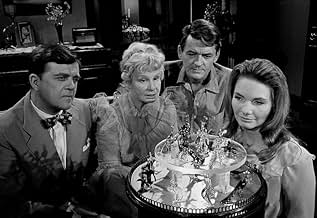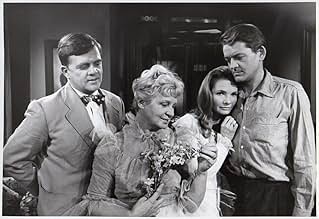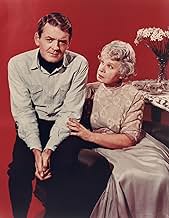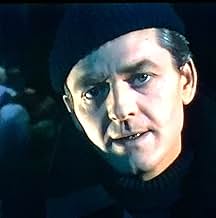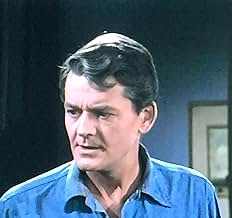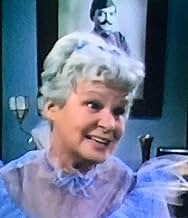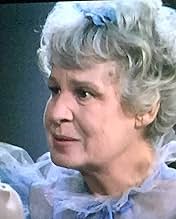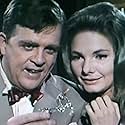Füge eine Handlung in deiner Sprache hinzuAmanda Wingfield dominates her children with faded gentility and exaggerated tales of her Southern belle past.Amanda Wingfield dominates her children with faded gentility and exaggerated tales of her Southern belle past.Amanda Wingfield dominates her children with faded gentility and exaggerated tales of her Southern belle past.
- Für 1 Primetime Emmy nominiert
- 1 Nominierung insgesamt
Empfohlene Bewertungen
I love Shirley Booth, and I love The Glass Menagerie, but this version of Tennessee Williams's play just isn't very good. It's one of my favorite plays, with both the male and female leads highly coveted as fantastic parts in the theater. When the chemistry between the mother and son is realistic, it's magical. Shirley Booth and Hal Holbrook acted like they'd just met, which is not the chemistry required for this play.
In The Glass Menagerie, an overbearing mother with good intentions wishes her shy, crippled daughter to have male attention, or as she calls it, "gentlemen callers" as she had when she was a debutante. The son works himself raw at the factory to support the family ever since his father left, but he hates wasting his life and is already at his breaking point when the play starts. If the mother and son don't have simmering tension in-between the emotionally high arguments, the play falls flat. For some reason, Hal's timing was incredibly slow. Shirley, who you would think would play the part perfectly, just isn't believable. The mother is written to be a former belle of the ball; she used to have class and live in beautiful surroundings, which is why she wants that experience so much for her daughter. With Shirley, it isn't believable she came from class. She looks at home in her disheveled environment, and she comes across as a nag rather than as a loving mother to her children.
Pat Hingle and Barbara Loden are the bright parts of the televised play. Barbara plays the daughter, a part that's easy to dismiss. She has hardly any lines and instead has to communicate her thoughts using her facial expressions as she practically hides and cowers in the background. Barbara has an incredibly expressive face, and she communicates everything she needs to in order to make her character memorable, understandable, and sympathetic. Pat, who ironically played Barbara's father in Splendor in the Grass in 1961, plays the Gentleman Caller, which is also a difficult part to play. The Gentleman Caller has to be incredibly nice without being flirtatious, and he has to bolster the daughter's confidence without seeming romantically interested in her. Pat masters the lines. He really seems like that guy in high school that's nice to everyone and enjoyed the mandatory leadership workshop so much he continues to spout off the phrases weeks later. If either of these two characters are your favorite in the show, you can rent this version, but I prefer the 1973 adaptation instead.
In The Glass Menagerie, an overbearing mother with good intentions wishes her shy, crippled daughter to have male attention, or as she calls it, "gentlemen callers" as she had when she was a debutante. The son works himself raw at the factory to support the family ever since his father left, but he hates wasting his life and is already at his breaking point when the play starts. If the mother and son don't have simmering tension in-between the emotionally high arguments, the play falls flat. For some reason, Hal's timing was incredibly slow. Shirley, who you would think would play the part perfectly, just isn't believable. The mother is written to be a former belle of the ball; she used to have class and live in beautiful surroundings, which is why she wants that experience so much for her daughter. With Shirley, it isn't believable she came from class. She looks at home in her disheveled environment, and she comes across as a nag rather than as a loving mother to her children.
Pat Hingle and Barbara Loden are the bright parts of the televised play. Barbara plays the daughter, a part that's easy to dismiss. She has hardly any lines and instead has to communicate her thoughts using her facial expressions as she practically hides and cowers in the background. Barbara has an incredibly expressive face, and she communicates everything she needs to in order to make her character memorable, understandable, and sympathetic. Pat, who ironically played Barbara's father in Splendor in the Grass in 1961, plays the Gentleman Caller, which is also a difficult part to play. The Gentleman Caller has to be incredibly nice without being flirtatious, and he has to bolster the daughter's confidence without seeming romantically interested in her. Pat masters the lines. He really seems like that guy in high school that's nice to everyone and enjoyed the mandatory leadership workshop so much he continues to spout off the phrases weeks later. If either of these two characters are your favorite in the show, you can rent this version, but I prefer the 1973 adaptation instead.
Tennessee Williams to me is one of the great playwrights. Even lesser work, such as 'Orpheus Descending', is better than the lesser work of many other playwrights not as influential. 'The Glass Menagerie' is one of his finest, the most poignant of his plays if not his boldest ('Cat on a Hot Tin Roof' perhaps in that regard) and all the Williams trademarks (realistic dialogue though with a lot of talk, complex characters, bold themes and powerful if quite melodramatic scenarios) are present.
Saw three versions of 'The Glass Menagerie' prior to this 1966 production with Shirley Booth, Hal Holbrook, Barbara Lodon and Pat Hingle. Which regrettably is not one of those "grew up with it and have close sentimental value to it" productions etc, being too young, and my main reason for seeing this 'The Glass Menagerie' was to see as many film/television adaptations of Williams' work as possible. My first, and my personal favourite version until seeing this, was the 1987 one with Paul Newman. Also liked quite a bit the Katharine Hepburn production, though that was not perfect. The 1950 film with Gertrude Lawrence and Jane Wyman fared least for me while still worth watching, a notable flaw being the tacked on ending. After seeing this 1966 production, this has replaced the Newman version as my favourite version of 'The Glass Menagerie'.
Do agree that some of the line delivery from Booth can be on the too quick side, but do feel that that is a trap/potential problem playing Amanda because she is so talkative. Noticed this with Hepburn too in the same role in her version.
Other than that, it is great. It still looks good, the sets being effectively claustrophobic while not ugly or too uncomfortably stifling. The costumes looked fine to me even if not the most evocative in the world. The colour looks attractive and doesn't date the production. Williams' dialogue has lost none of its edge, realism, emotion or intelligence, and never feels rambling despite the amount of talk there is, while the stage direction avoids descending into overly-overheated melodrama (which it could have been easily considering the story itself). Surprisingly, it also didn't come over as too stagy or creaky to me considering its age and medium, other later television adaptations of Williams did this aspect worse. The storytelling is compelling and suitably intense which increases throughout and the emotional power and play's spirit has not been lost, neither has the complexity of the characters. The climax is very poignant.
Regardless of any rushed line delivery, Booth is still very touching as Amanda and a powerful presence without being dominant. Holbrook has the right amount of intensity for Tom and Boden's expressive face and affectingly nuanced body language play large parts in why her Laura strikes an emotional chord. Hingle also has to be the most likeable, without being too much, Gentleman Caller there's ever been with the sincerity always ringing true. The chemistry between Booth and Holbrook doesn't always ignite, like occasionally early on, but when it grows and the tension mounts it does sear at its best.
In summation, a great production that deserves to be more widely known. 9/10
Saw three versions of 'The Glass Menagerie' prior to this 1966 production with Shirley Booth, Hal Holbrook, Barbara Lodon and Pat Hingle. Which regrettably is not one of those "grew up with it and have close sentimental value to it" productions etc, being too young, and my main reason for seeing this 'The Glass Menagerie' was to see as many film/television adaptations of Williams' work as possible. My first, and my personal favourite version until seeing this, was the 1987 one with Paul Newman. Also liked quite a bit the Katharine Hepburn production, though that was not perfect. The 1950 film with Gertrude Lawrence and Jane Wyman fared least for me while still worth watching, a notable flaw being the tacked on ending. After seeing this 1966 production, this has replaced the Newman version as my favourite version of 'The Glass Menagerie'.
Do agree that some of the line delivery from Booth can be on the too quick side, but do feel that that is a trap/potential problem playing Amanda because she is so talkative. Noticed this with Hepburn too in the same role in her version.
Other than that, it is great. It still looks good, the sets being effectively claustrophobic while not ugly or too uncomfortably stifling. The costumes looked fine to me even if not the most evocative in the world. The colour looks attractive and doesn't date the production. Williams' dialogue has lost none of its edge, realism, emotion or intelligence, and never feels rambling despite the amount of talk there is, while the stage direction avoids descending into overly-overheated melodrama (which it could have been easily considering the story itself). Surprisingly, it also didn't come over as too stagy or creaky to me considering its age and medium, other later television adaptations of Williams did this aspect worse. The storytelling is compelling and suitably intense which increases throughout and the emotional power and play's spirit has not been lost, neither has the complexity of the characters. The climax is very poignant.
Regardless of any rushed line delivery, Booth is still very touching as Amanda and a powerful presence without being dominant. Holbrook has the right amount of intensity for Tom and Boden's expressive face and affectingly nuanced body language play large parts in why her Laura strikes an emotional chord. Hingle also has to be the most likeable, without being too much, Gentleman Caller there's ever been with the sincerity always ringing true. The chemistry between Booth and Holbrook doesn't always ignite, like occasionally early on, but when it grows and the tension mounts it does sear at its best.
In summation, a great production that deserves to be more widely known. 9/10
This is about the fourth version of this play I have seen and like all the movie versions I've seen, it lacks something compared to the Broadway version I saw. There is something more intimate in seeing it live...live as Tennessee Williams originally intended his play.
This is a made for television version starring Shirley Booth, as the annoying and super-talkative head of the Wingfield family. She is a woman who talks a lot but says very little most of the time...a woman who almost seems to talk just to hear herself. Her son, Tom (Hal Holbrook) is a guy with secrets* and he frequently spends his evenings out of the apartment. As for Laura (Barbara Loden), the daughter, she's painfully shy and hyper-aware of her game leg. Mrs. Wingfield has no husband (you can really understand why he disappeared long ago) and spends all her time haranguing her kids-- pestering Laura to date and Tom to help Laura find a boyfriend. As for the siblings, they mostly try to ignore mother and her very old fashioned and overly gentile Southern ways...much like the affectations Blanche Dubois put on in "A Streetcar Named Desire".
Ultimately, Tom is so annoyed and pestered by his mother that he finally agrees to bring home a 'gentleman caller' for his sister. Jim O'Connor (Pat Hingle) is one of Tom's only friends and he brings him home for dinner. Little does Jim know that Mrs. Wingfield is hoping to snare him for poor Laura.
Compared to other versions, this one is fair. Although it's in color (which is very nice), I felt like Shirley Booth delivered her lines too quickly. I also felt that Barbara Loden was too pretty to play Laura...an interesting problem! Otherwise, the play is the play...and each version pretty much follows the script to the letter. Worth seeing...but I would still say it's best to see this one live.
*When I first saw this play, I thought that the gay subtext was obvious with Tom. After all, he supposedly goes to the movies almost every night and doesn't come home until very, very late. This double-life as well as the author's sexual orientation as well as Mrs. Wingfield NOT pestering him to find a girlfriend all would seem to indicate he's gay. Oddly, most of the time I've read about the play this subtext is never mentioned.
This is a made for television version starring Shirley Booth, as the annoying and super-talkative head of the Wingfield family. She is a woman who talks a lot but says very little most of the time...a woman who almost seems to talk just to hear herself. Her son, Tom (Hal Holbrook) is a guy with secrets* and he frequently spends his evenings out of the apartment. As for Laura (Barbara Loden), the daughter, she's painfully shy and hyper-aware of her game leg. Mrs. Wingfield has no husband (you can really understand why he disappeared long ago) and spends all her time haranguing her kids-- pestering Laura to date and Tom to help Laura find a boyfriend. As for the siblings, they mostly try to ignore mother and her very old fashioned and overly gentile Southern ways...much like the affectations Blanche Dubois put on in "A Streetcar Named Desire".
Ultimately, Tom is so annoyed and pestered by his mother that he finally agrees to bring home a 'gentleman caller' for his sister. Jim O'Connor (Pat Hingle) is one of Tom's only friends and he brings him home for dinner. Little does Jim know that Mrs. Wingfield is hoping to snare him for poor Laura.
Compared to other versions, this one is fair. Although it's in color (which is very nice), I felt like Shirley Booth delivered her lines too quickly. I also felt that Barbara Loden was too pretty to play Laura...an interesting problem! Otherwise, the play is the play...and each version pretty much follows the script to the letter. Worth seeing...but I would still say it's best to see this one live.
*When I first saw this play, I thought that the gay subtext was obvious with Tom. After all, he supposedly goes to the movies almost every night and doesn't come home until very, very late. This double-life as well as the author's sexual orientation as well as Mrs. Wingfield NOT pestering him to find a girlfriend all would seem to indicate he's gay. Oddly, most of the time I've read about the play this subtext is never mentioned.
I was 13 when this Glass Menagerie was first shown on TV, and it seemed like it was the most real thing I had ever seen on TV or in a movie. I remember Hal Holbrook's soliloquies, and I remember thinking Pat Hingle's Gentleman Caller was the nicest man in the world. All the Gentleman Callers that I have seen since were trying to be nice, but Hingle seemed to be absolutely genuine and completely effortless. (I learned that he had gone to UT-Austin, about 30 miles from where I was growing up.)
I noticed Hingle after that--saw him on stage in New York a few years later, with Fritz Weaver and Ken Howard (who had just left 1776) in Child's Play (no relation to Chucky!); and then many years later as Benjamin Franklin in the Bway revival of 1776--he was the best thing in the show--I didn't once wish he was Howard Da Silva.
I noticed Hingle after that--saw him on stage in New York a few years later, with Fritz Weaver and Ken Howard (who had just left 1776) in Child's Play (no relation to Chucky!); and then many years later as Benjamin Franklin in the Bway revival of 1776--he was the best thing in the show--I didn't once wish he was Howard Da Silva.
Up until I saw this at age 10 or 11, I thought virtually everything I saw on TV was a fantasy that had no connection whatsoever to real life. Seeing The Glass Menagerie for the first time was a shock. Obviously, I can't be sure, but my recollection of the production was that it was perfect (unlike the 70s TV version with Katharine Hepburn and Michael Moriarty). Seeing it started a long involvement for me with theatre and began my search for quality television. It is my #1 "want" to see again; the last time I looked for it at the Museum of Television (several years ago), they didn't even have it. At least it is finally listed here on IMDb, for which I am thankful.
Wusstest du schon
- WissenswertesThe movie was lost for decades. In 2015, the unedited video footage was found and it was reconstructed using an audio recording that a viewer had captured during the broadcast and later uploaded to The Internet Archive. It aired on Turner Classic Movies 50 years from the day of the original telecast.
- VerbindungenVersion of Die Glasmenagerie (1950)
Top-Auswahl
Melde dich zum Bewerten an und greife auf die Watchlist für personalisierte Empfehlungen zu.
Details
- Erscheinungsdatum
- Herkunftsländer
- Sprache
- Auch bekannt als
- CBS Playhouse: The Glass Menagerie
- Produktionsfirmen
- Weitere beteiligte Unternehmen bei IMDbPro anzeigen
Zu dieser Seite beitragen
Bearbeitung vorschlagen oder fehlenden Inhalt hinzufügen

Oberste Lücke
By what name was The Glass Menagerie (1966) officially released in Canada in English?
Antwort
